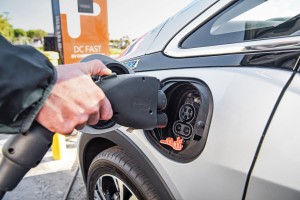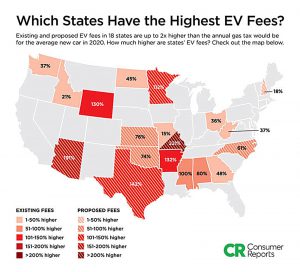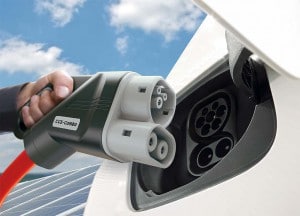
A growing number of states are adding special fees for EV owners to make up for lost gas taxes. But often, those fees are far bigger than what owners of gas vehicles pay.
When Tesla crossed a sales threshold and saw its federal tax incentives cut in half early this year, demand for products like the Model 3 sedan took a sharp tumble. EV proponents have long argued that government incentives are critical to build market momentum for battery-cars.
But not only have several states cut back on their own incentives, a growing number of them are adding new fees and taxes on battery-cars that can run significantly higher than what buyers of conventional gas and diesel-powered models face.
Authorities contend those added costs are justified because battery-powered vehicles aren’t subject to the gas taxes that fund both state and federal highway funds, a critical issue at a time when the nation’s roadway infrastructure has been fraying at the seams. But a new study by Consumer Reports finds that the added fees charged by many states actually exceed what an owner of a conventional vehicle would pay in fuel taxes.
(Consumers Want More Chargers to Offset Concerns about EVs)
“People should be allowed to choose a vehicle that’s safe, reliable, and better for the environment without being punished,” said Shannon Baker-Branstetter, CR’s manager of cars and energy policy.
According to the new study, 26 states now impose additional fees for electric vehicles, and 11 charge more than what owners would contribute in gas taxes were they driving conventional vehicles. Three states actually sock EV owners with fees that are twice what they’d pay in terms of gas taxes.
Another 12 states are considering the addition of new EV fees, 10 planning fees “fees greater than what a driver on average would pay in gas taxes,” CR reported, and seven states “would ratchet up the fees over time to twice the amount.”
Illinois is one of the latest states to create a special EV fee, an annual payment of $250. It originally was considering a figure of $1,000, but rolled that back in the face of a public outcry. That, said CR, is still about $100 more than the lost gas tax revenues, on average.
(EVs Will Reach Cost Parity With Gas Cars “Sooner Than People Think,” says GM’s Reuss)
Missouri is considering what could become the most onerous of new EV fees, with owners set to be facing payments that would be three times more than the ostensible loss in gas taxes. And the state will increase that to four times the penalty by 2025.
“Obviously, electric vehicles have no consumption that is taxable that makes its way to the Transportation Department,” Senator Gary Romine, who was the main sponsor of the legislation, told Consumer Reports. “These fees would be a way for electric car owners to pay their fair share for maintaining the roads and bridges in the state. We’re not trying to penalize the electric car owner.”
The surge in additional EV fees comes at a time when there’s also growing pushback against EV sales incentives, including the up to $7,500 in federal tax credits buyers can receive, depending on the specific vehicle they purchase. A number of states have enacted their own incentives, though some have cancelled those.
While some federal lawmakers have called for an expansion and extension of the federal credits, that is opposed by the Trump administration.
Meanwhile, Tesla, having hit a sales threshold set by Congress, saw its incentives halved in January and halved again on July 1. They will be eliminated entirely on Jan. 1, 2020. General Motors and Nissan will be the next carmakers to see their incentives phased out.
Few experts argue that battery-car buyers should contribute to highway funds. And Nicolas Loris, an economist with the conservative Heritage Foundation, said “It is literally highway robbery that EV owners don’t pay into the system.”
But EV proponents contend they should face no more than an equivalent level of fees to make up for the gas taxes they don’t pay. And some argue that, at least for now, reduced fees are justified in order to boost demand for vehicles that don’t contribute to air pollution and global warming.
(Barely One in Six Americans “Likely” to Buy an EV Next Time They’re in the Market)
“These increasingly onerous fees undermine the fundamental economics of electrifying the transportation sector,” Max Baumhefner, a staff attorney of the climate and energy program at the Natural Resources Defense Council, told CR.



Nothing is more unfair than Michigan’s annual license plate fee that is based on the original purchase price. I drive a 25 year old car that’s probably worth the cost of a full tank of gas that costs me over $200 because it was expensive when new.